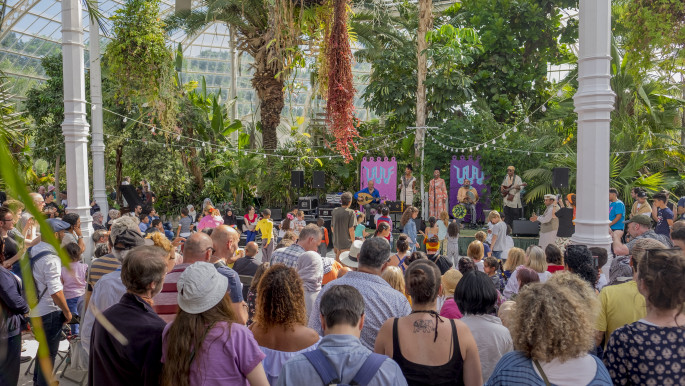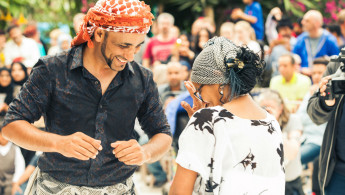'A revolution of the minds': Celebrating culture, diversity and talent at Liverpool Arab Arts Festival
With a varied programme of visual art, music, dance, film, theatre and literature, it promises to be the biggest one yet.
The festival, which runs from July 5-15, will see artists from across the Arab world, and will also include local artists from an Arab background.
World-renowned names and international artists set the tone for a major art scene, and additional resources have been awarded to the festival as the city continues to celebrate a decade since its stint as the European Capital of Culture.
The origin of the festival came from a group of concerned parents.
"We realised our children no longer wanted to be called by their Arabic names, they had no pride in their culture – we wanted to do something to show them, and their friends at school, that their culture had a lot to offer," Taher Qassim, the Chair of LAAF, tells The New Arab.
The change was almost immediate.
"My children were involved in the discussions behind the festival, they were very hands on, and pride and appreciation for their background followed immediately," Taher explains.
From a group of worried parents to a 20 years strong festival, LAAF has grown incredibly.
"Initially we used to worry if anyone would turn up, and last year we were worried about overcrowding and having to navigate crowd control," Taher alludes, speaking about how successful the event became, even more than he ever envisaged.
 |
When local aspiring artists see examples like Amina, hear her story, and see her performing at such a large event, it resonates well within the local community – that art, as a career, can be celebrated |  |
Titled, What Do I Know? the theme of this year's festival takes inspiration from the story of a local artist, Amina Atiq.
"Amina was determined and strong-willed," Anne Thwaite, the director of LAAF, tells The New Arab.
"And when local aspiring artists see examples like Amina, hear her story, and see her performing at such a large event, it resonates well within the local community – that art, as a career, can be celebrated."
Looking at the effects of the war in Yemen, the performance piece that has provided the foundation for the theme of the 20th anniversary, takes inspiration from Atiq's poetry – a spoken word poet from Liverpool of Yemeni background.
The piece is a collaboration with ice&fire theatre, a company which explores human rights stories through performance, and will premiere at LAAF on Sunday July 8 in Liverpool's Philharmonic Music Room.
The festival's growth has not been without its hurdles however.
"We face constant criticism and attacks from hardliners in Liverpool, who view the festival as a waste of time," says Taher, who adds that the theme is not just an opportunity for the audience to question themselves.
"It allows us to reflect on where we have come from and what we have learned during the past two decades. We've come a long way since it was founded in 1998," he adds.
"The Arab Spring affected people, both those of Arab background and the mainstream population, and created unrealistic expectations. While they expected a revolution that would change the world, they got the opposite. Extreme thought seems to have taken hold, and the festival itself is not above these thoughts."
Taher hopes that with the rapidly increasing culture scene, a true revolution could begin to take place – a revolution of the minds.
In a tribute to the inspired hope, Emel Mathlouthi, more often known as the 'voice of the Tunisian revolution,' will take to the stage Saturday July 7.
Protests fanned Tunisia when a man set himself alight in 2010 after being humiliated by municipal officers who confiscated his wares, giving birth to what was then called the Jasmine revolution.
As protests erupted, the charged atmosphere quickly spread to neighbouring countries.
At the forefront of this anger was Emel Mathlouthi's voice, capturing, distilling and amplifying hopes and fears forged through years of repression, injustice and economic hardships.
 |
At the forefront of this anger was Emel Mathlouthi's voice, capturing, distilling and amplifying hopes and fears forged through years of repression, injustice and economic hardships |  |
For years, TV and radio stations in her home country banned her songs, yet with the heady events of the Jasmine revolution, and with Emel at the forefront of the crowds, armed with nothing but the raw power of her words and her guitar, things quickly changed and Mathlouthi became known as "the voice of the revolution".
"We're free and unafraid; we're secrets that never die, the voice of those who resist." It was with these words that My Words are Free became Tunisia's unofficial national anthem.
The festival spans across several different mediums, from dance, to spoken word to theatre.
Gaza-born Ahmed Masoud's dark satire The Shroud Maker returns, drawing parallels between the history of Palestine and the life of an old seamstress.
Read more here: The Shroud Maker: A heart-wrenching tale of loss and survival amid decades of Israeli injustice
In film, Science in Exile, directed by Nicole Leghissa, looks at the recent violence in Syria, Yemen and Iraq and how it threatened the lives of four researchers, forcing them to suspend their work and flee for safety.
Other newer forms of Tunisian art feature contemporary dance group, Brotha from Another Motha, who will showcase the rich tapestry of culture born out of the revolution as a way of providing a creative outlet for young Tunisians in the wake of the Arab Spring.
"One of the biggest challenges has been trying to balance ambition of the project – wanting to remain true to our commitment to provide a platform to local and national Arab artists, while working within the constraints of limited financial resources," says Anne.
"Liverpool has the ability to drive forward talent, to introduce Arab art to the mainstream public. It also develops the concept of art itself, which is often not seen as a career choice in of itself," she adds.
Working against negative media perception, of both Arabs specifically, and migrants generally, is not always easy.
 |
| The Family Fun Day is LAAF's most anticipated event (LAAF) |
"Liverpool is one of the most dynamic, diverse and multicultural cities in the world. Last year, Syrian community leaders arranged coaches for recently resettled refugees, and if there was a moment I wish I could capture, it was seeing the happiness on the Syrian refugee community as they received a loving Liverpool welcome," Anne recalls.
"By celebrating the rich diverse cultures, we hope the festival goes some way in allowing for a positive perception to be shared, and it generates a strong sense of belonging and pride."
Taher adds: "People from all walks of life come to celebrate the vibrant and diverse Arab culture and art forms – in fact, the family day is the most looked forward to event and most successful. It's an opportunity for people to come together and ask themselves, what do I know now about Arab life?"
 |
Last year, Syrian community leaders arranged coaches for recently resettled refugees, and if there was a moment I wish I could capture, it was seeing the happiness on the Syrian refugee community as they received a loving Liverpool welcome |  |
Both Anne and Taher assure that the family day is the one event that cannot be compromised on, the focal point being the energy and sense of togetherness of the day.
"People travel nationally and internationally for the festival, and in the family day you see men and women, children and elderly, different backgrounds, all coming together," Taher says.
"We hope the theme this year will encourage the audience to step away from assumptions made around Arab life and explore its reality through the lived experiences of the artists, and how they're portrayed in the diverse forms.
"Nobody wants to leave their home, people flee because they are tired and want to live."
The Liverpool Arab Arts Festival will be held in multiple venues from 5 July - 15 July. The full line up of the programme can be found here.



